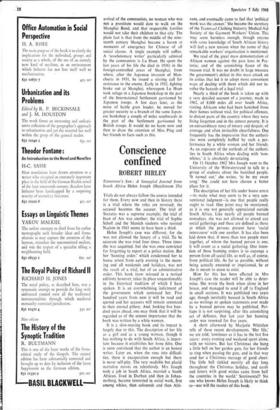Tomorrow's Sun : A Smuggled Journal from South Africa Helen
Joseph (Hutchinson 35s)
Conscience confined
ROBERT BIRLEY
Trials do not always follow the course intended for them. Every now and then in history there is a trial where the roles are reversed; the accused becomes the accuser. The trial of Socrates was a supreme example; the trial of Joan of Arc was another; the trial of Sophie Scholl and the Munich students who resisted Nazism in 1943 seems to have been a third.
Helen Joseph's case was different, for she was not allowed the luxury of a trial. To be accurate she was tried four times. Three times she was acquitted, but she was once convicted for forgetting to report at a police station. But her 'banning order,' which condemned her to house arrest from early evening to the morn- ing and all weekends and holidays, was not the result of a trial, but of an administrative order. This book (now reissued in a revised edition), however, takes its place unquestionably in the historical tradition of which I have spoken. It is an overwhelming indictment of the government which sentenced her. Five hundred years from now it will be read and quoted and her accusers will remain sentenced to their eternal pillory. And, looking five hun- dred years ahead, one may think that it will be regarded as of the utmost importance that the book was written by a white woman.
It is a slow-moving book and its impact is largely due to this. The description of her life as a girl and as a young woman, though it has nothing to do with South Africa, is impor- tant because it establishes her bona fides. One is soon convinced that the author is an honest writer. Later on, when she runs into difficul- ties, there is exasperation enough but there is never self-pity. The very readable but placid narrative moves on relentlessly. Mrs Joseph took a job in South Africa, married a South African, lived in Durban and then in Johan- nesburg, became interested in social work, first among whites, then coloureds and then Afri-
cans, and eventually came to feel that 'political work was the answer.' She became the secretary of the Transvaal Clothing Industry Medical Aid Society of the Garment Workers' Union. This may seem harmless enough, though anyone with some knowledge of South African history will feel a new tension when the name of that remarkable workers' organisation is mentioned.
We read of the great mass demonstration of African women against the pass laws in Pre- toria; and of the astonishing fiasco of the treason trial. It was no doubt in large measure the government's defeat in this mass attack on its critics that led it to adopt more convenient ways of dealing with them which did not in- volve the hazards of a legal trial.
Nearly a third of the book is taken up with a very detailed account of a journey, made in 1962, of 8,000 miles all over South Africa, visiting Africans who had been banished from their homes without trial, for political offences, to distant parts of the country where they were living forgotten and in the utmost poverty. It is an extraordinary story of misery and despair, of courage and often invincible cheerfulness. One frequently has the impression that the authori- ties were completely baffled by such a per- formance by a white woman and her friends. As an exposure of the methods of the authori- ties in South Africa when dealing with 'non- whites,' it is absolutely devastating.
On 11 October 1962 Mrs Joseph went to the University of the Witwatersrand to talk to a group of students about the banished people. 'It turned out,' she writes, 'to be my swan song.' She could not have chosen a better place for it.
The description of her life under house arrest —to make what may seem to be a very con- ventional judgment—is one that people really ought to read. One point may be mentioned, as it is one not generally appreciated outside South Africa. Like nearly all people banned nowadays, she was not allowed to attend any social gatherings and these are defined as those at which the persons present have 'social intercourse' with one another. It has also been laid down that, if more than two people meet together, of whom the banned person is one, it will count as a social gathering. One inten- tion of these banning orders is to expunge a person from all social life, as well as, of course, from political life. As far as possible, without being actually executed or imprisoned, he or she is meant to cease to exist.
How far this has been effected in Mrs Joseph's case the reader will be able to deter- mine. She wrote the book when alone in her house, and managed to send it off to England in small sections. It was published two years ago, though inevitably banned in South Africa as no writings or spoken statements ever made by a banned person may be published. Per- haps it is not surprising, after this astonishing act of defiance, that last year her banning order was renewed for five years.
A short afterword by Marjorie Whitelaw tells of these recent developments. 'Her life,' we are told, 'continues as it has in the last five years: every evening and weekend spent alone, with no visitors. But last Christmas she hung a little bell on her garden gate, for her friends to ring when passing the gate, and in that way send her a Christmas message of good cheer. The little bell tinkled merrily all day long throughout the Christmas holiday, and cards and letters with good wishes came from half the countries in the world.' Sentimental? No one who knows Helen Joseph is likely to think so—nor will the readers of this book.










































 Previous page
Previous page